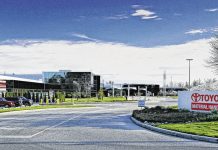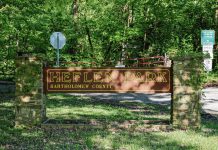A regional educational organization’s program that teaches collaboration among community stakeholders to solve community problems has been chosen for a nationwide role.
CivicLab, a program of the Columbus-based Community Education Coalition, has been named a Priority Partner of the Indianapolis-based Lumina Foundation, according to the foundation.
The foundation has set a goal of 60 percent of Americans attaining high-quality, postsecondary degrees or credentials by 2025. In September, the foundation designated 17 communities across the country as Talent Hubs to accelerate that goal.
Talent Hubs are communities that organize and align themselves around goals to offer and create multiple pathways to postsecondary success, and work to retain, attract and cultivate talent, according to the Lumina Foundation.
[sc:text-divider text-divider-title=”Story continues below gallery” ]
One of the designated Talent Hub communities was Columbus/Southeast Indiana, a 10-county area served by the Community Education Coalition and its Economic Opportunities through Education (EcO) Network. The local coalition, in its 20th year, received $350,000 to aid its efforts of increasing educational attainment in the region.
CivicLab will provide technical assistance and ongoing support to the 17 Talent Hubs and Lumina’s national Talent Hub team through 2020. So will the other Priority Partner, the National Equity Project of Oakland, California, whose focus is on equity, the Lumina Foundation said.
Technical assistance will include self-assessment survey tools focused on partnership health, and workshops for leaders of postsecondary education, business and community organizations that are working together to assist residents who are pursuing postsecondary credentials and well-paying jobs, Lumina said.
“We believe that Lumina is on the cutting edge in their thinking and grant-making efforts, focused on those communities that are building learning systems designed to improve educational attainment while developing their home-grown talent,” said Jack Hess, CivicLab’s executive director.
“CivicLab, in support of Lumina’s Goal 2025, is passionately committed to developing talent, and we subscribe to the belief that it’s a systems thing, not a single thing that will cause profound talent advancement,” Hess said.
CivicLab started five years ago as the Institute for Coalition Building, part of the EcO Phase II grant that included $5 million from the Lilly Endowment.
It uses the collaborative stakeholder engagement process for projects within the Southeast Indiana region — about 40 now — and shares it with communities across the country, said John Burnett, president and CEO of the Community Education Coalition.
The stakeholder engagement process is a way of thinking and working collaboratively to redesign a social system whose underlying conditions are causing unwanted problems.
The roots of the stakeholder process trace back to J. Irwin Miller, the late-Cummins chairman and philanthropist, who used it to leverage new schools and public buildings in Columbus, and initiate beneficial community programs.
CivicLab has partnered with more than 275 communities and organizations across the U.S. and trained more than 8,000 leaders, Burnett said.
“Their expertise in working with broad-based partnerships, specifically in developing communities’ capacity to accelerate educational attainment, is unmatched,” said Dakota Pawlicki, strategy officer for community mobilization at Lumina Foundation.
Lumina’s Community Partnerships for Attainment program has provided $10 million in grants to 75 cities nationwide, including Columbus/Southeast Indiana.
[sc:pullout-title pullout-title=”About CivicLab” ][sc:pullout-text-begin]
What: A 5-year-old program of the Columbus-based Community Education Coalition that teaches collaboration among community stakeholders.
Why: To achieve solutions to unwanted problems.
Where: Based in Columbus, 4555 Central Ave.
How: CivicLab’s process is used for projects in 10 Southeast Indiana counties, but it also is brought to other communities across the country so its stakeholders can learn.
[sc:pullout-text-end]




